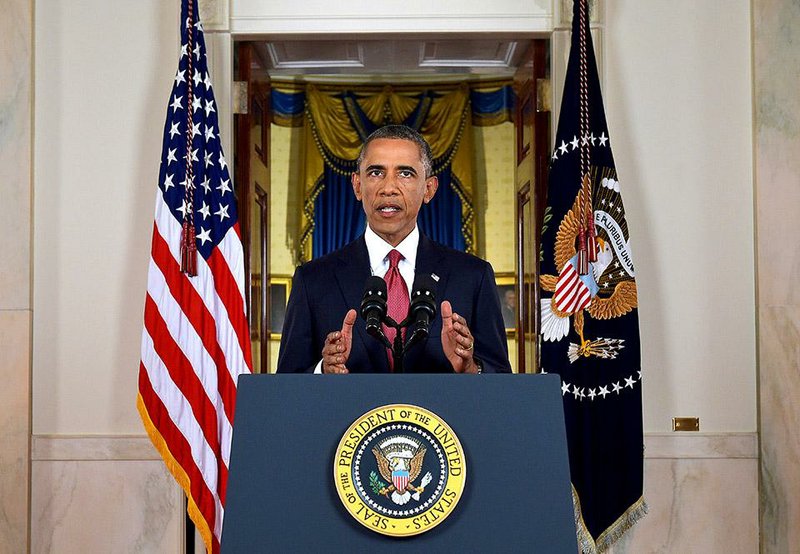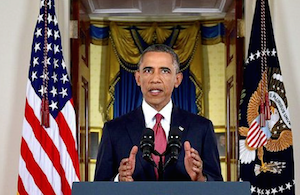WASHINGTON -- President Barack Obama moved Wednesday night to expand the U.S. military role in the volatile Middle East, vowing to form an international coalition and use airstrikes to target the Islamic State extremist group in Iraq and Syria.
The Islamic State has taken advantage of the instability created by a three-year Syrian civil war to seize large swaths of land in Iraq and Syria, where it has declared a caliphate, or state ruled by Islamic law.
Earlier this summer, Iraq's government asked the U.S. for help in confronting the militants, and Obama approved airstrikes within Iraq's borders to protect U.S. personnel there and to help alleviate humanitarian crises. Obama said Wednesday that the U.S. would target the militants "wherever they are," authorizing airstrikes inside Syria for the first time as well as an expansion of strikes in Iraq.
He outlined his strategy, which also includes training and equipping Syrian rebels, in a televised address to the nation.
He offered no timetable for how long the United States will conduct airstrikes, saying his objective is to "degrade and ultimately destroy" the Islamic State, which he called a terrorist organization.
"This counterterrorism campaign will be waged through a steady, relentless effort to take out ISIL wherever they exist using our air power and our support for partner forces on the ground," Obama said, using the acronym for the group's previous name, the Islamic State of Iraq and the Levant.
The president called for increased training of Iraqi security forces and arms shipments to vetted Syrian opposition fighters to help both groups in their fight against the extremists.
He also said 475 Americans would join the more than 1,000 U.S. military personnel already in Iraq to help with training and identifying targets for U.S. military airstrikes. But he said he was opposed to putting American combat troops on the ground.
"I want the American people to understand how this effort will be different from the wars in Iraq and Afghanistan," Obama said. "It will not involve American combat troops fighting on foreign soil."
U.S. Secretary of State John Kerry also said Wednesday that no U.S. combat troops would be deployed to fight the Islamic State, but added, "Unless, obviously, something very, very dramatic changes."
Some of Obama's advisers, including former Secretary of State Hillary Rodham Clinton, pressed him to arm the Syrian rebels early in their fight against Syrian President Bashar Assad. But Obama resisted, arguing that there was too much uncertainty about the composition of the rebel forces.
The president eventually approved a small CIA-run program to arm the rebels, but the effort he now seeks is broader and would be run by the Pentagon in countries near Syria's borders. Obama asked Congress for approval of such a program earlier this year, but the plan stalled on Capitol Hill.
Obama and Vice President Joe Biden called lawmakers Wednesday to press them to include authorization for the program in temporary funding legislation. In his speech, Obama said he had the authority to take the actions he outlined, but he was seeking "congressional support" for his plans.
Hours before Obama's speech, Senate Democratic leaders prepared legislation to authorize the U.S. military to train Syrian rebels. No money is likely to be attached to the measure, but a request for about $500 million might come later this fall, aides said.
Meanwhile, Rep. Kevin McCarthy of California, the House majority leader, called off a vote on a stopgap spending bill that was planned for today to consider Obama's request that training language be included. The president called the chairman of the House Appropriations Committee, Rep. Harold Rogers of Kentucky, to plead his case.
Rogers seemed upset that Obama would make such a significant request at the last minute.
"They've known about this problem for over a year, they've known that we were getting to do a [spending bill] and just as I was ready to drop it in the hopper, the president calls and asks if we would consider this," Rogers said. "In good faith, we're trying to get briefed up on what the request is, and it's a complicated, big-time change in policy that I'd hate to see us attach to a continuing resolution at the very last minute."
House Republicans called an emergency meeting for this morning to discuss their options, and leaders said they are leaning toward a vote to express some support for a broader campaign against the Islamic State.
'Broad coalition'
The U.S. also has been enlisting help from allies in Europe, the Middle East and elsewhere, and Obama said Wednesday that the U.S. would lead a "broad coalition" against the Islamic State.
France's foreign minister said Wednesday that his country was ready to take part in airstrikes against extremist fighters in Iraq if needed. Laurent Fabius called for international mobilization against the Islamic State group, which he called "this transnational danger that could reach all the way to our soil."
Hundreds of French radicals have joined the fighters in Syria and Iraq, and French authorities fear that they will return with violent skills and stage attacks at home.
The German government announced that it was sending assault rifles, ammunition, anti-tank weapons and armored vehicles to Kurdish forces fighting the Islamic State in Iraq, breaking with Berlin's previous reluctance to send weapons into conflicts.
Obama also called Saudi King Abdullah on Wednesday, ahead of a meeting of Arab leaders to discuss their contributions to the coalition against the Islamic State. Officials said Saudi Arabia indicated it would agree to an American request to provide bases to train moderate Syrian opposition fighters.
Saudi Arabia and other Sunni states have grown increasingly alarmed at the threat from Islamic State, fearing that citizens who join the extremists will return home to stage attacks, according to a U.S. official who spoke on condition of anonymity. The official said the Saudis know that about 1,000 Saudis are fighting with the Islamic State.
Kerry is flying to that country today to press foreign ministers of other Sunni Arab nations for commitments to the coalition, including the Persian Gulf states, Jordan and Turkey. Lebanon, with a multisectarian society, and Shiite-majority Iraq also are participating in the talks.
Kerry met with Iraqi leaders Wednesday in Baghdad, where he pledged U.S. support for eliminating the extremist group. The White House announced Wednesday that it was providing $25 million in immediate military assistance to the Iraqi government.
"This is a fight that the Iraqi people must win, but it's also a fight that the rest of the world needs to win with them," Kerry said after the first high-level meeting between the U.S. and new Iraqi Prime Minister Haider al-Abadi. "And it's a fight the United States and the rest of the world need to support every single step of the way."
Al-Abadi, who was sworn into office days ago, told Kerry that the U.S. and other foreign allies must help Iraq stem the threat of the Sunni militants who poured in from Syria, where the Islamic State has established a safe haven.
"Of course, our role is to defend our country, but the international community is responsible to protect Iraq and protect Iraqis in the whole region," al-Abadi said. "What's happening in Syria is coming across to Iraq. We cannot cross that border. It's an international border, but there is a role for the international community, for the United Nations to do that role ... to act immediately to stop the spread of this cancer."
Kerry said nearly 40 nations already have committed to contribute to what he predicted will be a worldwide fight to defeat the Islamic State.
Border concerns
For Obama, Wednesday's address was a chance to show his critics that he has a robust plan for defeating the militants.
Republicans have accused him of ignoring months of warnings about the threat posed to the U.S. by the Islamic State. Democratic allies also have grumbled in recent days that Obama has been slow in striking back after the militants released videos of the beheadings of two American journalists in Syria.
U.S. officials share the fear of other nations, that citizens who have joined the militant group could return to launch attacks.
On Wednesday, Francis Taylor, undersecretary for intelligence and analysis at the Department of Homeland Security said the department is "unaware of any specific credible threat to the U.S. homeland" from the Islamic State, a statement Obama repeated in his address.
However, Taylor cautioned that the group "constitutes an active and serious threat within the region and could attempt attacks on U.S. targets overseas with little or no warning."
In addition, he said Islamic State extremists have discussed infiltrating the U.S. through its southern border with Mexico.
Taylor told the Senate Homeland Security and Governmental Affairs Committee that the Sunni militants have been tracked discussing the idea on social-media sites.
"There have been Twitter and social-media exchanges among ISIL adherents across the globe speaking about that as a possibility," Taylor said in response to a question from Sen. John McCain, R-Ariz.
Referring to the 1,933-mile boundary with Mexico, Taylor said he was "satisfied that we have the intelligence and the capability at our border that would prevent that activity."
U.S. intelligence officials said they are skeptical that Mexican drug cartels would let jihadists use their turf or delivery routes to attack the U.S. The cartels know that terrorist attackers moving through areas they control would almost certainly result in retaliation, said two officials, who requested anonymity to discuss classified intelligence assessments.
Rep. Michael McCaul, R-Texas, chairman of the House Homeland Security Committee, said his biggest concern is the unknown number of young Westerners who are recruited by the Islamic State and other militant groups.
"One of the biggest worries from a counterterrorism perspective is unknown terrorists, those with no criminal record or intelligence traces, who could use a valid U.S. passport or visa waiver program to enter or exit the homeland," McCaul said.
Former Vice President Dick Cheney called Wednesday for launching "immediate, sustained, simultaneous action" to defeat the Islamic State, saying Obama bears responsibility for the danger the al-Qaida breakaway group now poses to America's interests.
In a speech at a conservative think tank hours before Obama's address to the nation, Cheney said the president must show a new commitment to doing "what it takes, for as long as it takes" to defeat them.
"Inaction by America spells opportunity for our adversaries," he said. "While the president was claiming the tide of war was receding and core al-Qaida was decimated, the threat was actually increasing."
Information for this article was contributed by Julie Pace, Donna Cassata, Andrew Taylor, Josh Lederman, Lara Jakes, Sylvie Corbet and staff members of The Associated Press; by Mike Dorning, Angela Greiling Keane, Roger Runningen, Nicole Gaouette and Roxana Tiron of Bloomberg News; by Ed O'Keefe, Adam Goldman and Paul Kane of The Washington Post; by Jonathan Weisman, Mark Landler, Michael D. Shear, Michael E. Gordon and Eric Schmitt of The New York Times; by Lisa Hagen of Hearst Newspapers; by Michael A. Memoli of the Tribune Washington Bureau; and by Roy Gutman of McClatchy Newspapers.
A Section on 09/11/2014


